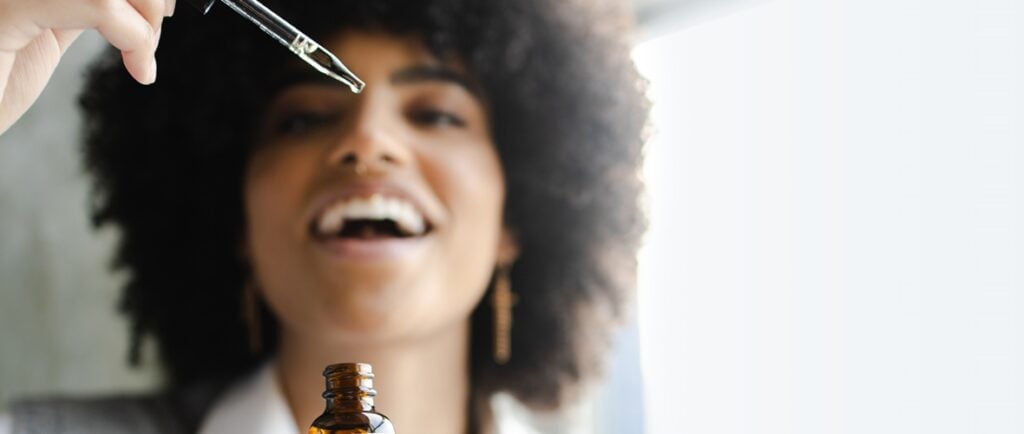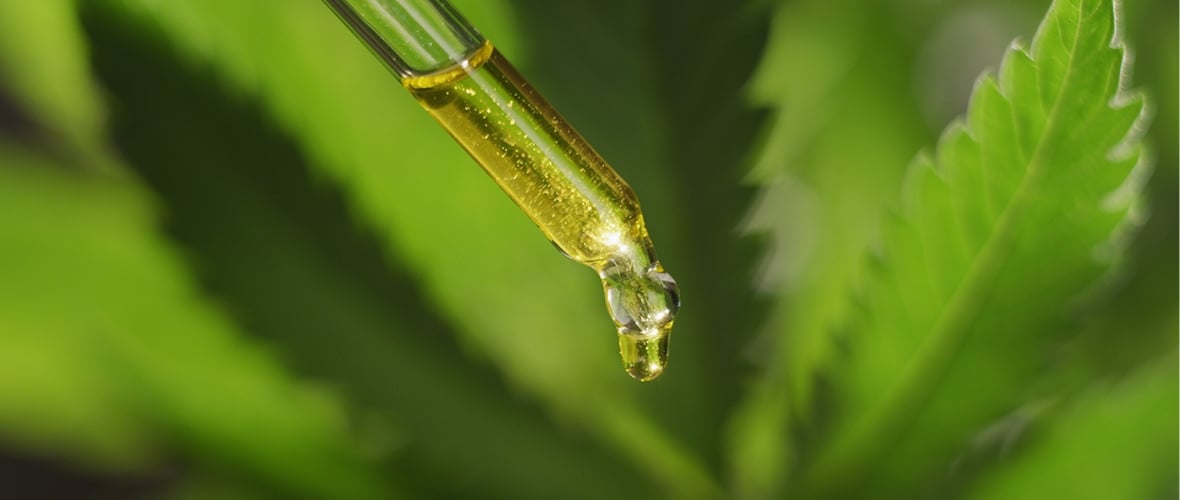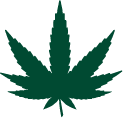
Medically reviewed by
Dr. John Rackham
Written by Michael Wright
Updated on November 8th, 2023

If you’ve explored some of our helpful blogs on what CBD is, the benefits of cannabidiol, how to take CBD, and other related questions, you’re probably ready to take the plunge and explore the vast array of incredible products featuring this remarkable cannabis compound. The question then becomes, “How much CBD should I take?”
Unfortunately, there is not a uniform answer to this question. Every person is different, which means every person’s perfect dose can be different. We each have our own unique physiology. Height, weight, metabolism, and CBD tolerance are just a few of the factors that go into determining our own Goldilocks CBD dosage: the serving dose that’s just right.
There are other factors that affect dosage, as well. So, before we talk about finding the perfect serving size or dose of CBD, let’s have a quick refresher course on the popular cannabis compound, cannabidiol.

What Is CBD?
When we talk about CBD gummies, CBD oil tinctures, and all of the other popular CBD products out there, we sometimes lose track of the fact that CBD itself is a fascinating and complex compound that produces unique and exciting effects and health benefits.

CBD
CBD, or cannabidiol,1 is a chemical compound found in the cannabis plant. Cannabidiol is one of several such cannabis compounds, which are called cannabinoids. There are over 100 different cannabinoids in the cannabis hemp plant, and cannabidiol is considered one of the two major cannabinoids, along with THC.21

THC
THC, or tetrahydrocannabinol, is the psychoactive compound associated with marijuana. That means, THC is the cannabinoid whose effects get you “high.” And marijuana is the term used for cannabis plants3 that contain more than 0.3% THC.
Cannabis plants that contain less than 0.3% THC are called hemp plants. When you purchase legal CBD products, you are purchasing products whose cannabidiol is derived from cannabis hemp. Since the THC content in hemp-derived THC is nearly undetectable and cannabidiol itself has no psychoactive effects, CBD products are, themselves, non-intoxicating.
While it doesn’t get you “high,” CBD does offer a ton of health and wellness benefits. This is a result of CBD’s interaction with the body’s endocannabinoid system4. The endocannabinoid system51 helps to regulate other systems in the body, most notably the central and peripheral nervous systems. This helps the body with such crucial functions as mood, memory, appetite, sleep, pain and inflammation management, and several more.
The body produces its own cannabinoids (or endocannabinoids) which interact with receptors to kick these other systems into high gear. CBD and its sister cannabinoids interact similarly with these receptors. In the case of CBD, this interaction bolsters the body’s ability to manage these functions6, offering seemingly boundless health and wellness potential.7**
Bioavailability: CBD Gummies & CBD Capsules vs. CBD Oil & Vapes
So, you know what CBD is. The next step is understanding the extent and rate at which the body absorbs CBD. This is called “bioavailability.” And it’s crucial to understand bioavailability if you’re trying to figure out the best dosage of CBD oil products for you.
We’ve already discussed how everyone’s body is different, and we all react in a different way to CBD. But there are other factors that affect bioavailability, as well. One factor is the method of delivery. For instance, CBD vaping allows you to absorb a higher percentage of your CBD than a CBD edible, which has to pass through the digestive system before it can be fully absorbed. On the other hand, CBD stays in your system longer with an edible for the very same reason. CBD topicals and CBD taken sublingually, such as with a CBD oil tincture, have differing rates, as well. In general, vaping and sublingual CBD use will start to work quicker than edibles and capsules, but the effects will not last as long. Understanding your CBD product’s bioavailability will allow you to better understand what dosage to take.

Other factors that affect how your body absorbs CBD include the strength of your CBD product (check the milligrams of active ingredients per serving on the packaging) and the kind of CBD used: full-spectrum CBD vs. broad-spectrum CBD vs. CBD isolate.
It’s important to understand these things, particularly when you switch from CBD product to CBD product, so that you have a better idea of what effects to expect—and how you should be dosing those CBD products.
Is It Possible to Take Too Much CBD?
One last thing we need to nail down before we answer the big dosage question is, “Is it possible to take too much CBD?” Well, according to the World Health Organization8, you can safely take up to 1500 mg of CBD in a day. Considering most single doses range between 25 mg and 50 mg of CBD, it would take a lot of effort (and expense) to even approach that mark. And even if you did, CBD is non-toxic. So, the most likely result of such overindulgence would be an overwhelming urge to go to bed.
Nevertheless, it’s always a good idea to stick with the recommended dose for all CBD products. CBD side effects are generally a result of greatly exceeding the recommended dosage. Those side effects can include fatigue, dry mouth, reduced appetite, and diarrhea.
It’s good to have an understanding of the guardrails as you begin using any new health products. And we support the recommendation that you consult with your physician before trying any new supplement, so that you can make an informed decision. While the extent is still being studied, CBD can interact with medications, such as certain antibiotics, blood pressure, cholesterol, seizure, and anxiety medications. Check with your pharmacist or doctor if you are taking prescription medications to minimize any chances of side effects from current medication use.
How to Find the Right CBD Product Dosage for You
So, now we’ve had a refresher course on what CBD is, how the body absorbs CBD, and even a quick lesson on maximum CBD doses. This brings us to our final question: How much CBD should you take? That is, how do you find your perfect dosage?
The answer to the dosage question lies within you. Every person has a different physiology, with factors that include height, body mass, weight, and tolerance, among other things. And every person reacts to various supplements differently, including CBD oil products.
Our expert advice is to start slowly. Take half of the recommended dosage the first time around … or less. If you’re taking CBD Multivitamin Gummies and the recommended serving dosage is two 25 mg gummies, start with one. If you’re trying our CBD Oil Calming Tincture for the first time and the package says a single 1mL dropper is your serving dosage, try a half dropper or a quarter dropper of CBD oil the first time. The point is to start with a low dosage and slowly work your way up until you find the effective serving dosage for you. It is important to understand that there is no uniformity whatsoever on labeling requirements for CBD products. Your bottle may say 25 mg CBD capsules or perhaps just 750 mg CBD. Focus on the specific dose (i.e. 15 mg, 25 mg, etc.) that you require to have the desired effects. Also, pay close attention to the package size while noting the amount of CBD (usually in milligrams) per dose/serving. For these reasons, some people may prefer oil tinctures and capsules over topical CBD products, due to ease of dosing.
And don’t add extra doses during the same session if you aren’t feeling anything. Those bonus doses will defeat the purpose of what you’re doing. If you do end up feeling effects, you won’t know if it’s your original dose kicking in or the effects of the second dose. You could also build up unnecessary tolerance levels. It may take some time to find that sweet spot of maximum benefit with minimal side effects. Start low and go slow, but don’t be afraid to increase your dose. If you feel like it doesn’t do anything, you likely just need a higher dose for the desired effects.
In the case of products like our CBD Oil Calming Tincture or CBD Sleep Tincture, if you tried a quarter dropper of CBD oil the first time and you didn’t feel any effects, move up to a half dropper the next day. If you still feel no effects, move up to three-quarters of a dropper of CBD oil the following day, and so forth. Be slow and methodical in finding your personal Goldilocks serving, the one that’s “just right” for you.
CBD Dosage Calculator: Factoring Body Weight & CBD Strength
Here’s a handy dosage calculator to help you find the ideal dosage for your needs. Simply enter your body weight and desired CBD effects (mild, moderate, or heavy) to find the right CBD dose (in mg) for you!
A Dose of Useful Information!
We hope this article has helped you on your CBD journey. We encourage you to read more of our informative (and hopefully, fun!) blog articles. And if you ever have any questions about cannabidiol or any of our legal cannabis products, don’t hesitate to contact our customer service representatives. We’re always here to help you have the best CBD experience possible.
Trying CBD for the first time? Our Original Mixed-Berry CBD Gummies are a great place to start!
- Felton, Kathleen. “Every Question You Have About CBD—Answered.” Health.com, https://www.health.com/condition/chronic-pain/what-is-cbd. Updated 12 December 2019.
- Holland, Kimberly. “CBD vs. THC: What’s the Difference?” Healthline.com, https://www.healthline.com/health/cbd-vs-thc. Updated 20 July 2020.
- Ferguson, Sian. “Hemp vs. Marijuana: What’s the Difference?” Healthline.com, https://www.healthline.com/health/hemp-vs-marijuana. 27 August 2020.
- Zou, Shenglong and Kumar, Ujendra. “Cannabinoid Receptors and the Endocannabinoid System: Signaling and Function in the Central Nervous System.” International Journal of Molecular Sciences, https://www.mdpi.com/1422-0067/19/3/833. 13 March 2018.
- Raypole, Crystal. “A Simple Guide to the Endocannabinoid System.” Healthline.com, https://www.healthline.com/health/endocannabinoid-system. 17 May 2019.
- Bauer, Brent A. “What Are the Benefits of CBD — And Is It Safe to Use?” Mayo Clinic, https://www.mayoclinic.org/healthy-lifestyle/consumer-health/expert-answers/is-cbd-safe-and-effective/faq-20446700. 18 December 2020.
- Moltke, Julie and Hindocha, Chandni. “Reasons for Cannabidiol Use: A Cross-sectional Study of CBD Users, Focusing on Self-perceived Stress, Anxiety, and Sleep Problems.” Journal of Cannabis Research, https://jcannabisresearch.biomedcentral.com/articles/10.1186/s42238-021-00061-5. 18 February 2021.
- Uncredited. “World Health Organization Reports CBD Oil Is Generally Safe.” Resources to Recover: Gateway to Mental Health Services, https://www.rtor.org/2019/07/05/who-report-on-cbd-oil/. 5 July 2019.







